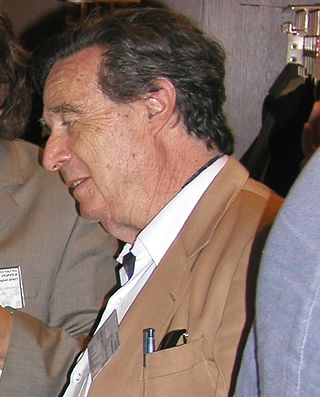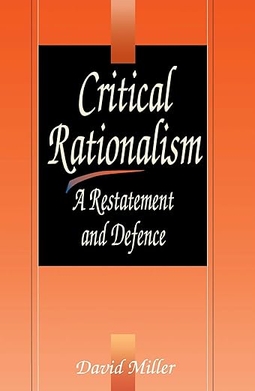Related Research Articles

Falsifiability is a deductive standard of evaluation of scientific theories and hypotheses, introduced by the philosopher of science Karl Popper in his book The Logic of Scientific Discovery (1934). A theory or hypothesis is falsifiable if it can be logically contradicted by an empirical test.

Sir Karl Raimund Popper was an Austrian–British philosopher, academic and social commentator. One of the 20th century's most influential philosophers of science, Popper is known for his rejection of the classical inductivist views on the scientific method in favour of empirical falsification. According to Popper, a theory in the empirical sciences can never be proven, but it can be falsified, meaning that it can be scrutinised with decisive experiments. Popper was opposed to the classical justificationist account of knowledge, which he replaced with critical rationalism, namely "the first non-justificational philosophy of criticism in the history of philosophy".

First formulated by David Hume, the problem of induction questions our reasons for believing that the future will resemble the past, or more broadly it questions predictions about unobserved things based on previous observations. This inference from the observed to the unobserved is known as "inductive inferences". Hume, while acknowledging that everyone does and must make such inferences, argued that there is no non-circular way to justify them, thereby undermining one of the Enlightenment pillars of rationality.

Mario Augusto Bunge was an Argentine-Canadian philosopher and physicist. His philosophical writings combined scientific realism, systemism, materialism, emergentism, and other principles.
Critical rationalism is an epistemological philosophy advanced by Karl Popper on the basis that, if a statement cannot be logically deduced, it might nevertheless be possible to logically falsify it. Following Hume, Popper rejected any inductive logic that is ampliative, i.e., any logic that can provide more knowledge than deductive logic. This led Popper to his falsifiability criterion.
The historiography of science or the historiography of the history of science is the study of the history and methodology of the sub-discipline of history, known as the history of science, including its disciplinary aspects and practices and the study of its own historical development.

Hans Albert was a German philosopher. He was professor of social sciences at the University of Mannheim from 1963, and remained at the university until 1989. His fields of research were social sciences and general studies of methods. He was a critical rationalist, paying special attention to rational heuristics. Albert was a strong critic of the continental hermeneutic tradition coming from Heidegger and Gadamer.
Pancritical rationalism, also called comprehensively critical rationalism (CCR), is a development of critical rationalism and panrationalism originated by William Warren Bartley in his book The Retreat to Commitment. PCR attempts to work around the problem of ultimate commitment or infinite regress by decoupling criticism and justification. A pancritical rationalist holds all positions open to criticism, including PCR itself. Such a position in principle never resorts to appeal to authority for justification of stances, since all authorities are held to be intrinsically fallible.

William Warren Bartley III, known as W. W. Bartley III, was an American philosopher specializing in 20th century philosophy, language and logic, and the Vienna Circle.
In philosophy, verisimilitude is the notion that some propositions are closer to being true than other propositions. The problem of verisimilitude is the problem of articulating what it takes for one false theory to be closer to the truth than another false theory.

Originally, fallibilism is the philosophical principle that propositions can be accepted even though they cannot be conclusively proven or justified, or that neither knowledge nor belief is certain. The term was coined in the late nineteenth century by the American philosopher Charles Sanders Peirce, as a response to foundationalism. Theorists, following Austrian-British philosopher Karl Popper, may also refer to fallibilism as the notion that knowledge might turn out to be false. Furthermore, fallibilism is said to imply corrigibilism, the principle that propositions are open to revision. Fallibilism is often juxtaposed with infallibilism.
Verificationism, also known as the verification principle or the verifiability criterion of meaning, is the philosophical doctrine which asserts that a statement is meaningful only if it is either empirically verifiable or a truth of logic.
Alan Musgrave is an English-born New Zealand philosopher.
The positivism dispute was a political-philosophical dispute between the critical rationalists and the Frankfurt School in 1961, about the methodology of the social sciences. It grew into a broad discussion within German sociology from 1961 to 1969. The naming itself is controversial, since it was the Frankfurt School proponents who accused the critical rationalists of being positivists—while the latter considered themselves to be opponents of positivism.

Joseph Agassi was an Israeli academic with contributions in logic, scientific method, and philosophy. He studied under Karl Popper and taught at the London School of Economics.

Hans-Joachim Niemann, is a German philosopher and PhD chemist, who has become known especially as a translator and editor of works by Karl Popper, including first editions and first translations. As a scholarly writer, he first published scientific papers, then many essays and several books on Karl Popper's philosophy and Critical Rationalism, including a 400-page Lexicon of Critical Rationalism. His Popper studies helped to establish Karl Popper as a major ethicist and as an important biophilosopher.

John William Nevill Watkins was an English philosopher, a professor at the London School of Economics from 1966 until his retirement in 1989 and a prominent proponent of critical rationalism.

The Myth of the Framework: In Defence of Science and Rationality is a 1994 book by the philosopher Karl Popper.

Critical Rationalism: A Restatement and Defence (1994) is a book on the philosophy of science by the philosopher David Miller. Book reviews include those of John Watkins in the British Journal for the Philosophy of Science and Michael Redhead in Analytic Philosophy. The book seeks to restate and extend the epistemology of Karl Popper, whose general philosophy has been termed 'critical rationalism'.
The Kuhn–Popper debate was a philosophical debate about research methodologies and the growth of knowledge that happened over a series of essays during the 1965 International Colloquium in the Philosophy of Science at the University of London. The debate had three major areas of contention: the existence of a scientific method, the specific actions and practices of scientists, and the differentiation between scientific knowledge and other forms of knowledge. Initially sparked by a disagreement about the role of the normal scientist, Thomas Kuhn and Karl Popper both had equally valid arguments: one prescriptive, and one realistic. Thomas Kuhn proposed a sociological model of normal science and revolutionary science to represent how research progresses under paradigms and paradigm shifts, a model that Karl Popper rejected for its deterministic implications. Popper instead proposed that science should aim to follow the hypothetico-deductive model at all times, contending that 'normality' should never be an accepted standard for scientific research. This counter-proposal sparked the debate.
References
- 1 2 Miller, David W. (1994). Critical rationalism: a restatement and defence . La Salle, Ill: Open Court. ISBN 0-8126-9198-9 – via Internet Archive.
- ↑ "University of Warwick | Philosophy | Associates | David Miller". Archived from the original on 7 November 2017. Retrieved 6 November 2017.
- ↑ Miller, D. (1997). "Sir Karl Raimund Popper, C. H., F. B. A. 28 July 1902--17 September 1994.: Elected F.R.S. 1976". Biographical Memoirs of Fellows of the Royal Society . 43: 369–409. doi: 10.1098/rsbm.1997.0021 .
- ↑ Miller, David W. (2006). Out of error: further essays on critical rationalism. Aldershot, Hants, England: Ashgate. ISBN 0-7546-5068-5.
- ↑ Miller, D. (1999). "Being an Absolute Skeptic". Science. 284 (5420): 1625–1626. Bibcode:1999Sci...284.1625M. doi:10.1126/science.284.5420.1625. S2CID 170982916.